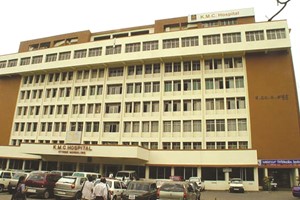Philips’ Future Health Index 2022 Report - the result of an independent survey of almost 3,000 healthcare leaders across 15 countries - offers compelling evidence that cardiology leaders recognize the potential of technologies such as telehealth and artificial intelligence (AI) to extend patient care beyond their facilities. Over one-quarter (28%) of those surveyed considered extending care beyond their facilities one of their top priorities. At the same time, almost as many (27%) reported that improving technology infrastructure within their facility was a priority - significantly more than the global average (19%) for all categories of healthcare leaders surveyed. Amid growing evidence that the SARS-CoV-2 virus at the heart of the COVID-19 pandemic may result in long-term cardiovascular injury [1], and with chronic heart disease already endemic in the aging population, it appears that cardiology leaders not only see technology infrastructure improvements as key to managing and monitoring patients over extended periods of time in out-of-hospital settings, but also key to better diagnosing and treating a potential tsunami of new patients.
Investment in enabling technologies
The findings are borne out by what they are currently investing in. When asked, over half (57%) said artificial intelligence (AI), two-fifths (40%) said digital health records, and over one-third (37%) said telehealth. Asked whether they would still be investing in these technologies in three years’ time, the percentage for digital health records fell to less than one-third (27%) while the figure for telehealth fell marginally to just under a third (32%). However, the percentage investing in AI in three years’ time increased from over half (57%) to more than three-quarters (79%). Digital health records and telehealth are clearly precursors to AI, since both are needed to provide the rich data sets needed for AI applications. Although cardiology leaders may be somewhat behind radiology leaders in implementing AI (Philips FHI Radiology Data Cut), they are clearly on the same path. Three-quarters (75%) of the cardiology healthcare leaders surveyed expressed the opinion that predictive analytics, which frequently employs AI and machine learning, could have a positive impact on health equality. This was higher than the figure for informatics leaders (66%) and the global average for all healthcare leaders surveyed (68%).
Confidence in data
While cardiology leaders may be intent on investing in digital infrastructures to better use data, they also appear to have confidence in the data available to them, with over two-thirds (68%) believing the data is accurate. Nevertheless, over half (58%) reported that the use of data in their facility is more of a burden than an asset, compared to the global average for all healthcare leaders surveyed of less than half (46%). Approximately two-thirds (62%) cited data siloes as one of the main issues, and more than one-quarter (28%) reported data security and privacy as a top issue. Cardiovascular disease is often lifestyle related, with other risk factors including pre-existing conditions such as clinical depression [2]. As a result, the effective risk assessment and management of cardiovascular disease often requires access to accurate long-term holistic patient histories, key elements of which are often in different privacy-protected silos.
Barriers to adoption
In common with radiology and informatics leaders, cardiology leaders also cited financial constraints and staff resistance to upgrading technology as barriers to the better use of data. They were also in line with their peers (43% vs the 42% global average) in saying that improving the expertise of their staff would help them better utilize data. One-third (33%) reported that tracking performance metrics and KPIs would help, while a similar number (30%) said that investing in technology infrastructure would support better use of data - significantly higher numbers than the corresponding global averages (23% for KPI tracking and 22% for technology infrastructure investment).
“The fact that more cardiology leaders regard performance tracking and technology infrastructure investments as important to the better use of data suggests these are areas where the health technology industry could help. Over one-third said they could benefit most by collaborating with health technology companies, notably to provide the resources necessary to expedite new technology adoption. Nearly one-third (29%) said they wanted guidance on data analytics to ensure continuous performance improvement.” Alexandra Goncalves, MD, Chief Medical Officer, Precision Diagnosis at Philips.
Predictive analytics to supercharge care
It certainly appears cardiology leaders are pinning their hopes on predictive analytics to expand and improve patient care. While just under half (49%) of those surveyed have already adopted predictive analytics or are currently in the process of doing so, placing them somewhat behind informatics leaders (58%) and radiology leaders (59%), the vast majority agreed that the technology could be of benefit in both clinical and operational use cases (91% cited benefits in clinical use cases and 85% in operational use cases). Over one-quarter stated that the technology could most benefit predictive maintenance (27%) and remote patient monitoring (26%), which is not surprising given the increasing use of cardiac implantable electronic devices and remote patient monitoring solutions to deal with the escalating number of heart patients.
Improving staff satisfaction and retention
While many of these technology investments will help cardiologists ensure the financial health of their hospital and deliver high quality care, they will also help address one of the most urgent needs cited by respondents - the need to increase staff satisfaction and retention. Almost one-third (30%) of the cardiology leaders surveyed said these staff-related issues are a top priority, with almost as many (28%) believing staff satisfaction and retention would continue to be a top priority in three years’ time - figures that match the global averages for all healthcare leaders surveyed. Faced with a backlog of patients due to the COVID-19 pandemic, and the expanding number of new patients, it appears that the world shortage of cardiologists to deal with them is something that is not going to go away. Clearly, cardiology leaders are looking to health tech companies and digital technologies for solutions.
https://www.philips.com/











